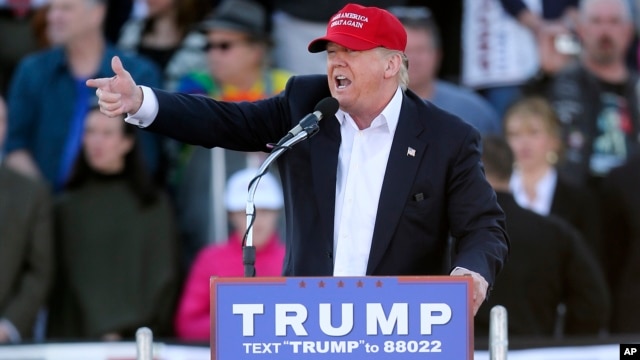
Trump’s Appeal: Straight Talk Meets Economic Angst
Jim Malone
WASHINGTON—The Republican presidential race has entered a crucial phase as frontrunner Donald Trump edges closer to securing the party’s nomination. Time is running out for Trump’s rivals to slow down his momentum in a year when Republican voters seem to prefer a political outsider to any number of more established candidates.
Tuesday’s contests in Michigan and Mississippi could be telling as far as anti-Trump efforts impacting the race. A new NBC News/Wall Street Journal/Marist poll has Trump leading in Michigan with 41 percent, followed by Texas Senator Ted Cruz at 22 percent and Florida Senator Marco Rubio with 17 percent.
Trump may be leading but it appears he is leaving nothing to chance. “No matter what is happening, no matter what you are doing. If you get laid off on Tuesday, I still want you voting. I’ll get you a new job, don’t worry about it,” Trump told supporters at rally in Michigan, a state hit hard with job layoffs in recent years.
Bold promises
Trump’s straight-talk appeal has resonated especially with older white working class voters like Shawn Dumais of New Hampshire. “He’s wanting to make America great again and that’s what we need.”
FILE – Republican presidential candidate Donald Trump points as he speaks during a rally Feb. 28, 2016.
Trump’s bold promises prompt skepticism among critics but don’t bother others including one South Carolina man who didn’t want to give his name. “He may not get to do half of it but the truth of the matter is, just him saying it and trying it suits me.”
But Trump has attracted plenty of detractors as well, including protestors who see him as a bully, anti-immigrant and racially insensitive.
One of the keys to Trump’s success is that he has tapped into deep voter frustration and anger. “These people who are voting for him have been ignored, in their mind, by both major parties for 15 to 20 years and they see somebody who is finally saying, I’m on your side,” said Henry Olsen, a senior fellow at the Ethics and Public Policy Center in Washington. “And they are not necessarily hard-core Republicans, they are not Tea Party-ists, they are not far-right. If anything they are casual conservatives.”
Wrath of the establishment
Trump’s rise has sparked a backlash from the Republican establishment including the party’s 2012 nominee, Mitt Romney: “Donald Trump says he admires Vladimir Putin and at the same time he’s called George W. Bush a liar. That is a twisted example of evil trumping good.”
The March 15th primaries now loom as perhaps the last chance for the Republican establishment to derail Trump’s march to the nomination. Five states hold primaries that day including Rubio’s home state of Florida and Governor John Kasich’s home state of Ohio.
Both states are winner-take-all in terms of delegate allocation and a Rubio victory in Florida would give him all of the state’s 99 delegates at stake. A Kasich victory in Ohio would yield him 66 delegates. Kasich is running close to Trump in Ohio, according to recent polls, but Rubio continues to trail Trump in Florida and hopes to benefit from a massive, well-funded ad campaign targeting Trump.
Any effort to derail Trump probably involves a Rubio victory in Florida and a Kasich win in Ohio, and the odds are not great, said John Fortier of the Bipartisan Policy Center in Washington. “Donald Trump is the strong leader and the likely nominee of the Republican Party. There are efforts underway from outsiders and the candidates in the race of trying to stop him, but a lot of that looks a little too late.”
Next few primaries crucial
Anti-Trump forces did take heart from the most recent contests over the weekend. Cruz defeated Trump in Kansas and Maine while Trump prevailed in Louisiana and Kentucky. Late-deciding voters in Louisiana turned what had been a big Trump lead into a narrow win. Establishment supporters hope it’s a sign of things to come.
Some Republicans fear the establishment-led effort to deny Trump the nomination could tear the party apart. Retired neuro-surgeon Ben Carson issued a warning as he suspended his presidential campaign. “We cannot do what we have done in the past and that is become fractured and splintered and fight each other and find a way to snatch defeat out of the jaws of victory.”
If Trump cannot secure outright the 1,237 delegates he needs to claim the nomination before the end of the primary and caucus voting in June, there could be a contested convention in July in Cleveland – and a very long, hot summer for the Republican Party.


